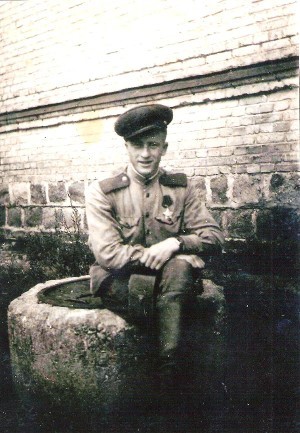Iosif Faigenboim was born in 1922 in the shtetl of Dunaievtsy, in western Ukraine. His father Aharon was a member of a Jewish agricultural kommuna, established in the area with aid from the American Jewish Distribution Committee. The JDC provided the kommuna with agricultural machinery, and Aharon became a tractor-driver. The venture proved to be successful. In the late 1920s, Aharon fulfilled administrative duties. In the early 1930s, the family settled in the town of Kamenets-Podolskii. In 1939, after the Soviet annexation of eastern Poland, he moved to Lvov, where the family was living at when the Soviet-German war began.
As an administrator sent from the original Soviet territories, Aharon Faigenboim succeeded in getting his family evacuated from Lvov. The evacuation train arrived in Poltava, east of Kiev. Iosif was drafted to repair airplanes, while the rest of the family, including his three younger brothers, continued their way eastward. When the enemy approached Poltava in September 1941, the aviation workshops were evacuated to western Siberia and, as an electrical technician for aircraft, Iosif Faigenboim was evacuated with them. He remembers this period as one of constant hunger. When the local conscription office reported a need for three technicians, Iosif was drafted into active service as a private.
Faigenboim was assigned to the 116th Tank Brigade. His baptism by fire took place near Voronezh, which, in June-July 1942, was surrounded by the German and Hungarian armies. The 116th Brigade was encircled by the enemy and destroyed. Only a few of its men succeeded in breaking out of the encirclement. Of the whole column to which Faigenboim belonged, only fifteen men did so, with only three of them reaching Red Army positions. (The rest of the men deserted).
After this episode Faigenboim served as a technician for telephone communication. Although communications is a branch of army in which the soldier only rarely shoots at the enemy, he constantly risks his life, with his usual mission being to maintain communication lines under enemy fire. Nevertheless, Iosif Faigenboim survived without serious injury, serving in southern Russia and in Ukraine, and ending the war in Germany. Although he was not promoted higher than corporal, he was awarded the Order of Glory, 3rd Class.
After the war Faigenboim worked as an electrician. In 1974, he left the USSR for Israel.
The "nationality question" at the front
"The constant talk about 'Yids in Tashkent' got to me in the brigade and I became quite fed up. Outwardly, I did not look Jewish, on the contrary I looked like a pure German, and when we were in Germany, some Germans once took me at once for an Aryan, one of theirs, especially because I spoke German almost fluently. Our guys in the company also thought that I was a German or a Russian by birth and that I must have had a skeleton in my closet so I somehow got hold of someone else's identify papers and was passing myself off as a Jew. I always stressed my [Jewish] nationality in the army. I showed that I was not afraid of anything, that I was braver than many others, and I tried to do my work better than others.Twice I was given the opportunity to leave the front line for an accelerated course of a military school, but I refused because I did not want people to say 'hey, look, another Jew has escaped from the front to the rear.' By the way, it was because of this 'nationality issue' question' that I refused to join the Party.Once I was called by the head of the political department of the brigade, Lieutenant-Colonel Sviridov, who asked directly why I refused to apply for admission to the Party. I told him straight out: 'I will join the Party when there are no longer any rabid antisemites in it.'
But they were in the Party, not only in the Party but also around it, and near it.
What is funny is that there was one argument that shut the mouths of many people who were eager to discuss the 'nationality question' with me. When I said to them – 'You are kolkhoz cattle, ignorant and dark. The Jews gave you God, so just sit quietly and hold your tongue'... That worked like a blow to the head."







